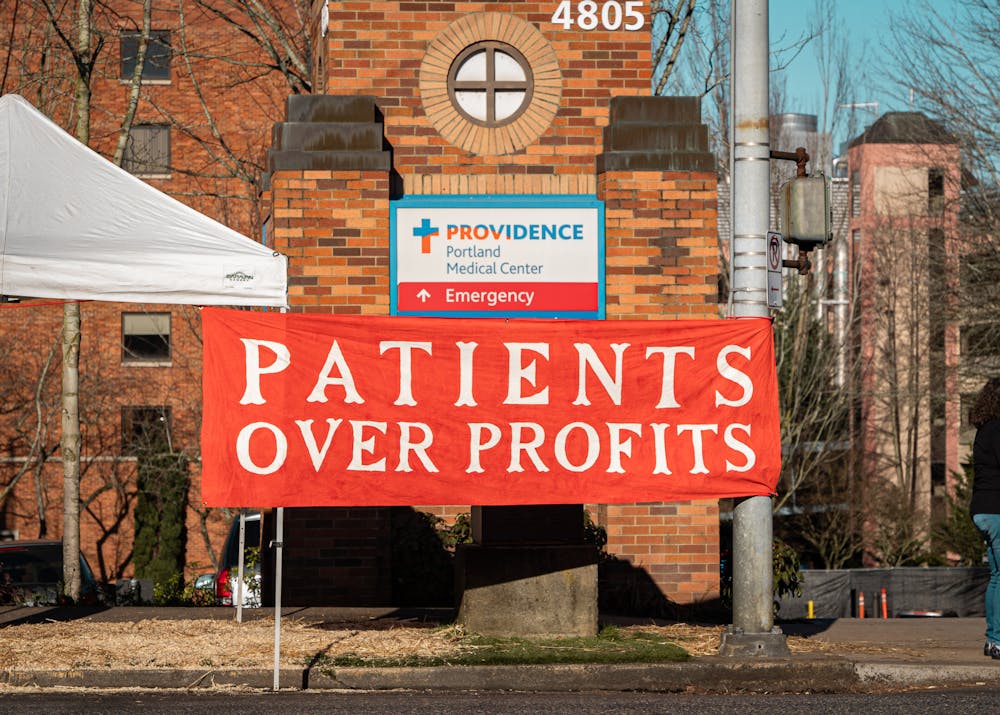After 13 days of picketing, over 5,000 nurses and some doctors at Providence hospitals continue to strike for better wages, staffing conditions and patient protection, affecting 91 UP nursing students who are assigned there for clinicals.
According to an email from the Dean of School of Nursing and Health Innovations (SONHI), Joane Moceri, clinicals for nursing students who are assigned to work at Providence hospitals will be delayed until at least Jan. 27. Students who are not placed at Providence locations are unaffected by the strike.
This is the largest nursing strike in Oregon’s history. Negotiations between the Oregon Nurses Association and Providence hospital continue as the strike remains unresolved and ongoing.
“A delayed start will provide support to our nurse colleagues, clinical partners, and our students as we work to provide them with the best education possible,” Moceri said in an email to SONHI students, faculty and staff. “We will reassess weekly as time progresses, remaining in communication with students, faculty, and Providence leadership during that time.”
Several UP nursing students with Providence placements have met with faculty advisors to discuss the impact of the strikes on their clinical experiences, including a delay on Providence nurse mentor assignments, according to senior nursing major Avery Morris.
“[The strike] is such an unpredictable situation that I haven't really thought about before, like what happens if I'm at clinical and [healthcare workers] decide to strike,” Morris said. “So the school has actually been really supportive of the students, and school-wise, I'm not stressed on how I'm gonna get my hours, how I'm gonna get my work done.”
According to the SONHI Bulletin, each nursing student is required to complete approximately 765 hours of on- and off-campus professional experience to fulfill graduation requirements.
Professional practice includes on-campus clinical experiences, such as labs and simulations, and off-campus clinical experiences, including hospital, community, ambulatory care settings and focused learning activities.
Erica Bailey, instructor and clinical relations specialist, declined to comment on how the SONHI plans to have students experiencing clinical delays make up for missed hours and referred all questions to Dean Moceri, who did not immediately respond to a request to comment at the time of this being published.
Though Morris is experiencing a delayed start to her clinicals, she believes clinical experience remains a valuable part of UP’s nursing education and looks forward to completing her clinical graduation requirements with the support of SONHI.
“I've learned the most at clinical sites,” Morris said. “Going into a real situation and interacting with the patients and getting that bedside manner, it's so valuable. And it really confirmed for me that…this is where I want to be. This is the field and the job that I want to be in.”
Morris adds that learning about the strike outside the classroom has strengthened her nursing values.
“[The strike] definitely kind of reinforced the idea that we [nurses] want to put our patients first,” Morris said.
Although it is unclear when the Providence strike will end, other clinical placements, including Kaiser Westside Medical Center and Legacy Salmon Creek Medical Center, have remained unaffected by the strike.
Camille Kuroiwa-Lewis is the Living Editor for The Beacon. She can be reached at kuroiwal26@up.edu.
Kaylee Monahan is a reporter for The Beacon. She can be reached at monahan26@up.edu.








